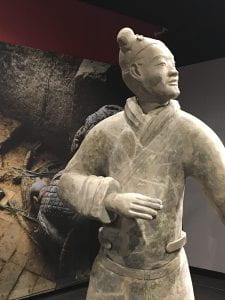
Terra cotta warriors
During the last week in August, I attended a special exhibit of the Terra Cotta warriors at Seattle’s Pacific Science Center. The warriors are a touring collection of a tiny subset of the vast clay “army” buried over 2,000 years ago, encircling the tomb of China’s first emperor. While the clay soldiers have been excavated and meticulously studied and cataloged for decades, the tomb itself remains untouched and unopened. Why? Researchers are afraid that the mere act of opening it will irrevocably change (and perhaps destroy) its contents.
It’s an odd coincidence that I heard this story at the current moment of my dissertation research, as I’m beginning to realize that by studying my area of interest, I may actually be changing it. I have no delusions of grandeur that my poking around is akin to opening the tomb of China’s first emperor, undisturbed for millennia…but there is enough of a parallel for consideration.
Prospecting a survey
My dissertation research aims to understand what people do with their “raw” or uninterpreted genetic data, typically obtained from direct-to-consumer genetic testing (DTC-GT, we’re talking 23andMe, AncestryDNA, etc.). The section of the project I’m broaching now is to survey individuals who have done DTC-GT to understand whether they’ve accessed their raw data and, if so, what – if anything – they’re doing with it. A few gracious souls, some strangers and some friends, have agreed to pre-test my survey instrument before it goes out into the field. As I might have suspected, several of the pre-testers were not previously aware that their raw data was available to them. In taking my survey, they inevitably find out.
There’s nothing inherently wrong with downloading your data, but I don’t want to be the one to tip the finger on the scale of someone deciding to do it. And it’s not without consequence. For one, genetic data can be sensitive, and downloading it means it’s only as secure as your computer/device. Plus you might decide to use third-party interpretation services, another area of my research, several of which can be a waste of time and money, and again may potentially expose your data to security breaches.
Ultimately, I want to understand the behavior and motivations of both those who do and don’t get their raw data, without influencing or encouraging any particular behavior. I’m considering adding a disclaimer to the end of the survey, clarifying that I am not suggesting people should get their raw data if they haven’t already done so. But in a way, I’m asking them not to think of a pink elephant.
Hawthorne effect
Social scientists will be screaming at me by now, “Duh, this is the Hawthorne effect!!” Observe people’s behavior and they will change it. Maybe this is actually a mini twist, where by asking people about their behavior, I may be changing it. At any rate, I am touching my finger to a pond and making ripples, when really I want to hover over the pond, swooping from shore to shore, and taking note of all there is to be seen.
I do take some solace in knowing that, unlike the sacred stillness of the Chinese emperor’s tomb, I am asking people about something they engage with in the messiness of everyday life, where they are exposed to many people and ideas that could ultimately plant the same seeds in their head. If not my survey today, then maybe 23andMe’s website tomorrow would have reminded them their raw data was available for download. But nevertheless, I am responsible for my actions as a researcher and for the consequences of asking the questions I do – a responsibility I take this seriously.
(I hope you’re not still thinking of that pink elephant.)